Product Description
Think about your favorite meal—and then consider how you would feel if you were told you simply couldn’t eat it  anymore…no exceptions!
anymore…no exceptions!
Why does this happen all the time in long-term care? Dietitian Diane Hall says there’s no reason for it! A person’s right to express personal food preferences and make dietary choices is an important facet of person-centered care. This pragmatic guidebook for administrators, nurses, food service managers, and dietitians demonstrates step by step how to honor residents’ food choices while also meeting regulatory requirements and reducing liability. The Inside Scoop on Informed Choice clarifies what informed choice and self-directed dining are, and it provides the necessary forms, documentation, and learning activities to simplify the process of implementing a person-centered approach to dining in your care community.
Told in a unique storytelling format, this engaging and user-friendly resource debunks common myths and misinformation about special diets, restricted diets, doctors’ orders, and federal regulations. It shows you just how to satisfy a resident’s right to enjoy his or her favorite foods, preferred mealtimes, and customary eating habits, while also keeping the person safe. Time-saving tools based on federal guidelines and regulations for nursing homes help to streamline the individualization of care plans and include:
- Sample forms and guidelines, assessment tools, surveys, quizzes, and QAPI-based dining solutions (also available as downloadable resources with purchase of the book)
- Tip sheets for specialized diets (diabetic, low sodium, cardiac, altered consistency, tube feeding, and fluid restricted)
Each section of the book includes a Learning Center with educational activities that prepare you for a quiz to qualify for continuing education units (CEUs). With the expert resources and explanations offered throughout, The Inside Scoop on Informed Choice is your guide to successfully achieving individualized food services.

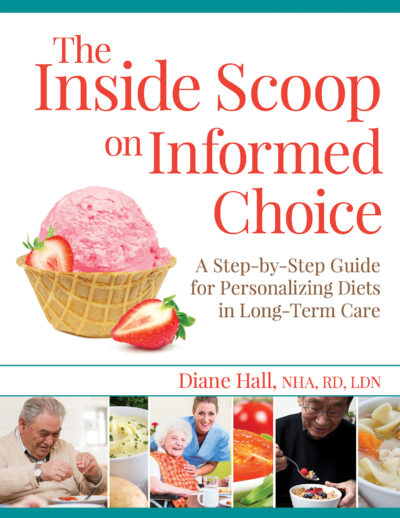
 Diane Hall, NHA, RD, LDN, is an expert consultant and nationally recognized speaker on culture change and dining standards in long-term care. A registered dietitian and licensed nursing home administrator, she began as a dining manager to a nursing home in 1982. She eventually founded Balanced Senior Nutrition, a full-service consulting firm with dietitians servicing nursing homes, assisted living facilities, home health agencies, and community organizations throughout the Southeast. She remains on the cutting-edge of individualized nutrition care, earning respect in her field by staying current on changing federal and state regulations. She is widely regarded as a visionary and leader in the rapidly changing and progressing field of senior nutrition.
Diane Hall, NHA, RD, LDN, is an expert consultant and nationally recognized speaker on culture change and dining standards in long-term care. A registered dietitian and licensed nursing home administrator, she began as a dining manager to a nursing home in 1982. She eventually founded Balanced Senior Nutrition, a full-service consulting firm with dietitians servicing nursing homes, assisted living facilities, home health agencies, and community organizations throughout the Southeast. She remains on the cutting-edge of individualized nutrition care, earning respect in her field by staying current on changing federal and state regulations. She is widely regarded as a visionary and leader in the rapidly changing and progressing field of senior nutrition.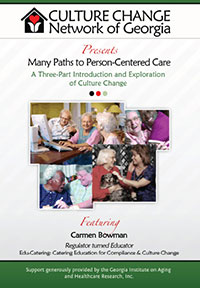
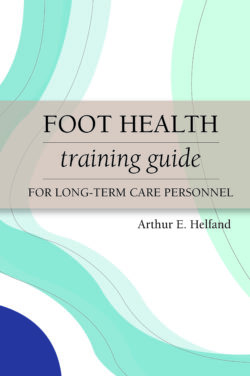
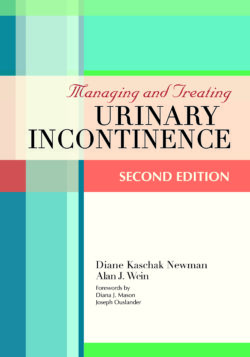
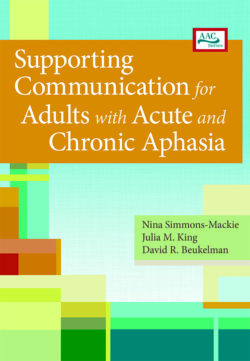
Administrator –
“The Inside Scoop on Informed Choice is a much-needed and ingeniously written guide that can educate staff members, residents, and their family members alike. Let’s face it: by and large, our society has a negative view of growing older, and still struggles (though less so, with increased advocacy efforts) to acknowledge that differing abilities don’t equate with strength vs. weakness. We often overlook or don’t even recognize how physical and/or cognitive challenges enable us to rob someone of his or her personhood. There is often no place where this is as evident as in congregate care environments such as nursing homes, assisted living facilities, or other similar settings where increasing needs and increasing age intersect. Regulations intended to protect vulnerable citizens, along with well-meaning but poorly trained staff, have often created a culture that is focused primarily on minimizing risk. Even in the best of circumstances, such environments have a tendency to infantilize or over-protect those who have raised us, fought for us, built our economy for us, and 80, 90, or 100-plus years sacrificing for us. Can’t we do better for them?
Diane Hall and her colleagues have recognized these realities and created a manual that is light enough in tone to make these harsh realities palatable (pun intended), while still getting the point across. The adoption of person-centered dining preferences and liberalized diets are an absolute necessity if we are to change the culture of aging in our continuum of care for elders. I applaud my colleagues for taking the time and effort to pack so much essential information into a format that can be used so well for educating everyone who is a part of delivering services to elders in our society.”
—Christopher P. Mulrooney, M.P.S., Ph.D., Assistant Dean, Department of Geriatrics, Florida State University College of Medicine
Administrator –
“The protection of a resident’s rights to make treatment decisions based on informed consent is the number one legal concern regarding person-directed living. For instance, therapeutic diets are medical decisions and therefore informed consent must be obtained if this diet is to be changed. This requires giving the resident adequate information on the benefits and potential consequences of a therapeutic diet including risks that are specific to the resident. A resident must be able to weigh the potential benefits and risks and make their own decisions regarding the food they eat. Of course, The Inside Scoop on Informed Choice provides the forms, action plans, and educational materials regarding regulations and evidence-based clinical guideline standards to effectively liberalize diets, while keeping people as safe as possible. I highly recommend it.”
—Karen Goldsmith, Attorney-at-Law at Goldsmith and Grout, P.A.
Administrator –
“Professionals taking care of seniors in the healthcare industry will definitely learn the New Dining Standards for long-term care. The material clearly demonstrates the step by step process in creating care plans for restricted diets, self-directed dining and for risky decisions. It gives the long-term care professional a great tool box to work from and creative ideas to implement these standards to increase the well-being of our senior communities.”
—Angela Gardener, MS, RD, CSG, LDN
Administrator –
“The Inside Scoop on Informed Choice is a unique guidebook written in everyday language that humanizes senior care by portraying fictionalized characters in real-life situations while providing the forms and procedures to create care plans based on informed choice and diet liberalization: a must-have for any care provider looking to change the culture of their community to one that puts people ahead of procedure.”
—Carmen Bowman, MHS, BSW, regulator turned educator, owner of Edu-Catering, consultant, trainer, former Colorado state surveyor, former policy analyst with CMS Central Office, teacher of national Basic Surveyor Course
Administrator –
“This guidebook uses easy-to-understand workflow processes and forms designed to unify existing procedures and paperwork. It promises to make training staff and other professionals easier and to create a community where person-directed dining is the standard.”
—Dr. John Potomski, Jr., DO, Past President, Florida Medical Directors Association
Administrator –
“As an attorney, respecting the dietary wishes of a resident that is capable of making decisions represents good ethical and clinical practice, and therefore is good legal risk management also. As long as the resident has been fully informed about risks and alternatives and the process of communication, negotiation, and risk mitigation has been documented thoroughly in the resident’s record, the facility is on firm ground from a legal perspective. This guidebook is an invaluable tool for providing that informed choice.”
—Marshall Kapp, J.D., M.P.H.
Administrator –
“As a Dietician Technician, Registered, I know that some of our nurses and doctors need to understand the new Dining Standards better and start asking the person who is getting the diet if they want it or not. I highly recommend giving this manual to other professionals because it is loaded with references backing The Inside Scoop on Informed Choice. Fantastic idea; a book written by two fictitious nursing home residents.”
—Sue Holland, D.T.R.
Administrator –
“This user-friendly resource is filled from cover to cover with pragmatic tips and guidelines as well as time-saving forms for planning and delivering individualized meals to meet dining preferences. A definitive guide to providing the tools and explanations for truly individualizing institutionally provided food services…[this book] is an invaluable and unreservedly recommended addition to professional, hospital, residential care facilities, college, and university library Health Care Management collections.”
—Midwest Book Review